Mentalizing Impairments, Pathological Personality and Aggression in Violent Offenders
DOI:
https://doi.org/10.13133/2724-2943/17437Keywords:
mentalizing, RFQ, pathological personality, aggression, offendersAbstract
Impairments in mentalizing abilities are thought to account for the high aggressive tendencies observed among individuals with pathological personality. However, the question of whether mentalizing impairments may mediate the pathways by which pathological personality leads to aggression has not yet been answered. This study first investigated the psychometric proprieties of the Italian version of the Reflective Functioning Questionnaire (RFQ). Then, we tested the mediating role of mentalizing in the relationship between the three pathological personality domains and aggressiveness. The study was conducted on a sample of 327 participants includinggroup of violent offenders (n=118) and a group of community participants (n=209). All subjects fulfilled the RFQ, the Personality Inventory for DSM-5 (PID-5) and the Aggression Questionnaire (AQ). Partial Least Squares–Path Modelling with higher-order construct definition was used. Mentalizing capacities were shown to significantly mediate the pathways leading some pathological personality traits to aggression. Data supported the factorial structure of the RFQ found in the original validation study. Results also support the existence of a second-order variable, mentalizing, resulting from the convergence of hypomentalizing and hypermentalizingPublished
2021-03-30
How to Cite
Velotti, P., Rogier, G., Ciavolino, E., Pasca, P., Beyer, S., & Fonagy, P. (2021). Mentalizing Impairments, Pathological Personality and Aggression in Violent Offenders. Psychology Hub, 38(1), 51–60. https://doi.org/10.13133/2724-2943/17437
Issue
Section
Original Article
License
Copyright (c) 2021 Psychology Hub

This work is licensed under a Creative Commons Attribution-NonCommercial-ShareAlike 4.0 International License.





